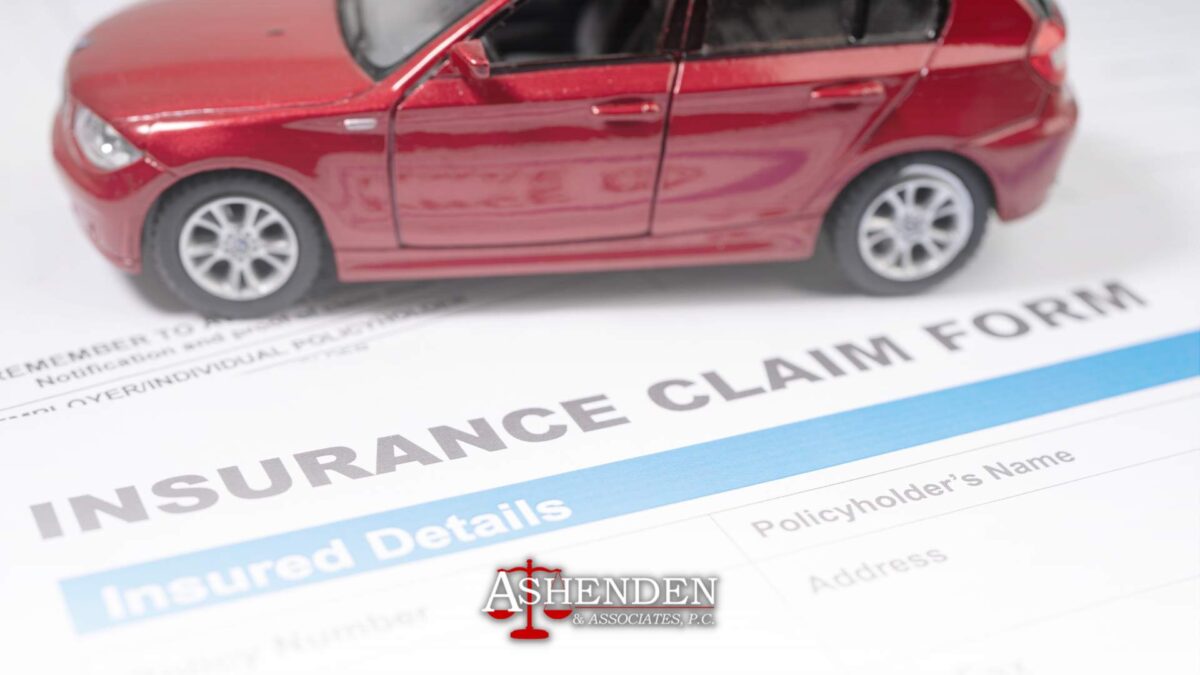Insurance subrogation is a vital concept regarding automobile accident claims. This legal process allows an insurance company to step into the shoes of the insured party after the insurer pays for damages resulting from an accident. Essentially, through a subrogation claim, the insurer seeks reimbursement from the party responsible for the accident, ensuring the financial burden falls on the right shoulders.
For victims of car accidents in Sandy Springs, understanding subrogation claims is crucial as it plays a significant role in how claims are handled and resolved. Ashenden & Associates brings expertise and dedicated legal support to help clients through this complex aspect of how subrogation works, ensuring subrogation rights are protected and fair compensation is pursued.
If you or a loved one has been injured in a car accident caused by another’s negligence, you deserve financial compensation. To schedule a free consultation with the Sandy Springs car accident attorneys, call 770-394-8909 today.

What is Subrogation in Insurance?
The insurance subrogation process is when an insurance company, having paid out a claim to its insured party, seeks reimbursement from the party responsible for causing the loss. This process allows the insurer to recover the amount paid to the insured for the damages.
A subrogation claim occurs after the insured has been compensated for their loss, and it helps to ensure that the financial burden of the loss is ultimately borne by the party at fault rather than the insurance company or the innocent insured party. This process not only aids in keeping insurance premiums in check but also upholds the principle of accountability in personal liability and property damage incidents.
When Does Insurance Subrogation Happen?
The subrogation process starts after the insured driver has received compensation from their insurance company for damages or losses. Following this payout, the insurer then seeks to recover these funds from the party responsible for causing the car accident, typically the other party’s insurance company. This typically happens when another driver is at fault, and their insurance is liable for the damages. After the initial insurance claim settlement, the subrogation is filed, enabling the insurer to seek reimbursement from the at-fault driver’s insurance company.

How Does Subrogation Work for the Insurance Carrier and the At-Fault Party
For the insurance carrier, subrogation begins after compensating the policyholder for the damages incurred. The carrier then seeks reimbursement by legally pursuing the at-fault driver or their insurance company. This process involves establishing the fault, quantifying the damages, and negotiating with the involved parties to recover the funds.
For the at-fault party, subrogation signifies their financial responsibility for the accident. They, or more commonly, their own insurance company, are required to reimburse the initial insurer for the insurance claim paid out. This transaction is handled between the insurance carriers, and it can lead to increased premiums for the at-fault party’s insurance policy.
Subrogation ensures that the costs of an accident are ultimately placed on the party responsible, while also protecting the non-at-fault party from financial loss.
Common Example of Insurance Subrogation
An example of subrogation occurs in car accidents where one driver is clearly at fault. Suppose Driver A’s car is hit by Driver B, who ran a red light. Driver A’s insurance company pays the repair costs for their vehicle under their collision policy.
In a subrogation process, Driver A’s insurer then seeks reimbursement from Driver B’s insurance since Driver B is responsible for the accident. This recovery includes the repair costs and any deductible paid by Driver A.
Through subrogation, Driver A’s insurer effectively recovers the payout from the at-fault party’s insurer, ensuring that the financial burden of the accident is placed on the responsible party.
Benefits of Insurance Subrogation

Subrogation offers many benefits, most importantly promoting fairness and accountability in handling insurance claims. It ensures that the at-fault party covers the financial responsibility for an accident or loss rather than the innocent party or their insurer. This process helps keep insurance premiums more stable for policyholders, as insurers can recover costs from the responsible parties, mitigating the need for rate increases due to frequent payouts.
Subrogation reinforces the liability principle, encouraging individuals and businesses to act responsibly to avoid negligence. For the insured parties, subrogation can also lead to the recovery of deductibles paid out in an insurance claim, providing financial relief.
What is a Waiver of Subrogation?
A waiver of subrogation is an agreement where an insured person relinquishes the right of their insurance company to pursue compensation from a third party responsible for an accident. This waiver of subrogation is typically agreed upon in certain contractual scenarios, such as car leasing or rental agreements.
Example of subrogation waiver: if a leased car is involved in an accident, the leasing company might have a waiver of the subrogation clause in their insurance contract. This means that even if another driver caused the accident, the insurance company of the person leasing the car cannot seek reimbursement from the at-fault driver or their insurer.
The waiver of subrogation is used to prevent insurance disputes and legal challenges, simplifying the claims process, but they may also impact the financial and liability implications for the parties involved in a car accident.
How Insurance Subrogation Affects the Insured Victim
Once the victim’s insurance company pays for the damages incurred in an accident, the insurer seeks reimbursement from the at-fault party’s insurer by filing a subrogation claim. For the insured victim, this process often means they can receive compensation more quickly without waiting for fault determinations and lengthy negotiations between insurance companies.
If the subrogation is successful, the insured may be refunded their deductible. However, it’s important to note that the insured victim may have limited control over the insurance claim process during subrogation, as their insurer takes the lead in pursuing recovery.

Subrogation in Different Types of Insurance Policies
Subrogation plays a crucial role across various types of insurance coverage, each with unique applications and implications. Whether in auto insurance, where insurers seek recovery from at-fault drivers, in health insurance, where providers pursue third parties responsible for medical bills, or property insurance, where damages caused by external factors are recovered, the principle of subrogation maintains consistency in the insurance industry.
Health Insurance Company
Subrogation allows a health insurance company to recover medical expenses paid on its policyholder’s behalf when another party is liable for those expenses.
For example, if a policyholder is injured in an accident caused by someone else and the health insurer pays their medical bills, they can pursue reimbursement from the at-fault party or the at-fault driver’s insurer, and even from the proceeds from a settlement or judgment..
Car Insurance Company
The insurance company files a subrogation insurance claim to seek reimbursement from the at-fault driver’s insurer. This typically follows scenarios where the insured party is not at fault.
For example, if a policyholder’s car is damaged due to another driver’s negligence, their car insurance company will cover the repair costs under the policy. The insurer will then pursue the at-fault driver’s insurance company to recover these costs.
Workers’ Comp
Subrogation regarding workers’ compensation insurance ensures that employers or their insurance providers are not burdened by costs from incidents where a third party is at fault.
For instance, if an employee is injured at work due to faulty equipment provided by an external vendor, the workers’ comp insurance initially covers the employee’s medical expenses and lost wages. However, through subrogation, the insurance company or the employer can seek reimbursement from the vendor responsible for the faulty equipment.
To learn more, be sure to contact a Sandy Springs work injury lawyer today.
Insurance Subrogation and Personal Injury Claims
Subrogation is pivotal in personal injury claims, particularly when an injured party’s losses are initially covered by their insurance. In such cases, after the insurance company compensates the injured party for medical expenses, lost wages, or other damages, it may seek reimbursement from the party legally responsible for the injury. This is commonly seen in auto accidents, slip and fall incidents, or workplace injuries where another’s negligence is involved. Sandy Springs personal injury attorneys and Sandy Springs slip and fall accident lawyers can provide more information during your free consultation.
Georgia Law and Insurance Subrogation
The “Made Whole” Doctrine in Georgia is a legal principle influencing how insurance claims are handled, particularly in subrogation situations. This doctrine, O.C.G.A. §33-24-56.1, asserts that an insured individual must be fully compensated for their losses (made whole) before the insurance company can pursue subrogation against a third party responsible for the damages.
In other words, the insured’s needs take priority over the insurer’s right to reimbursement. For instance, if someone incurs medical expenses and lost wages due to an accident, they must first receive full compensation covering all of their damages before their insurance company can seek to recover funds from the at-fault party. This doctrine is designed to ensure that victims of accidents or injuries are not short-changed in the compensation process and that their full financial recovery takes precedence over the insurance company’s interests.

Sandy Springs Car Accident Attorneys
If you’ve been involved in a car accident in Sandy Springs, don’t navigate the complex and overwhelming world of insurance claims alone. The experienced Sandy Springs auto accident attorneys at Ashenden & Associates are well-versed in handling these cases with the diligence and expertise you deserve. Their deep understanding of subrogation and the intricate aspects of car accident claims can be the key to ensuring your rights are protected, and you receive the compensation you are entitled to. Call Ashenden & Associates at 770-394-8909 to schedule a free initial consultation.

